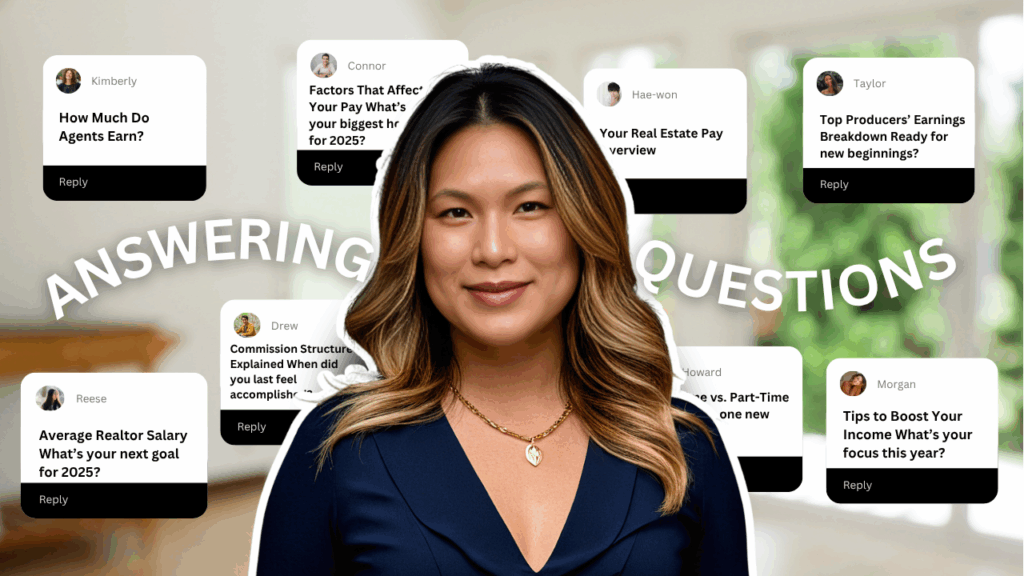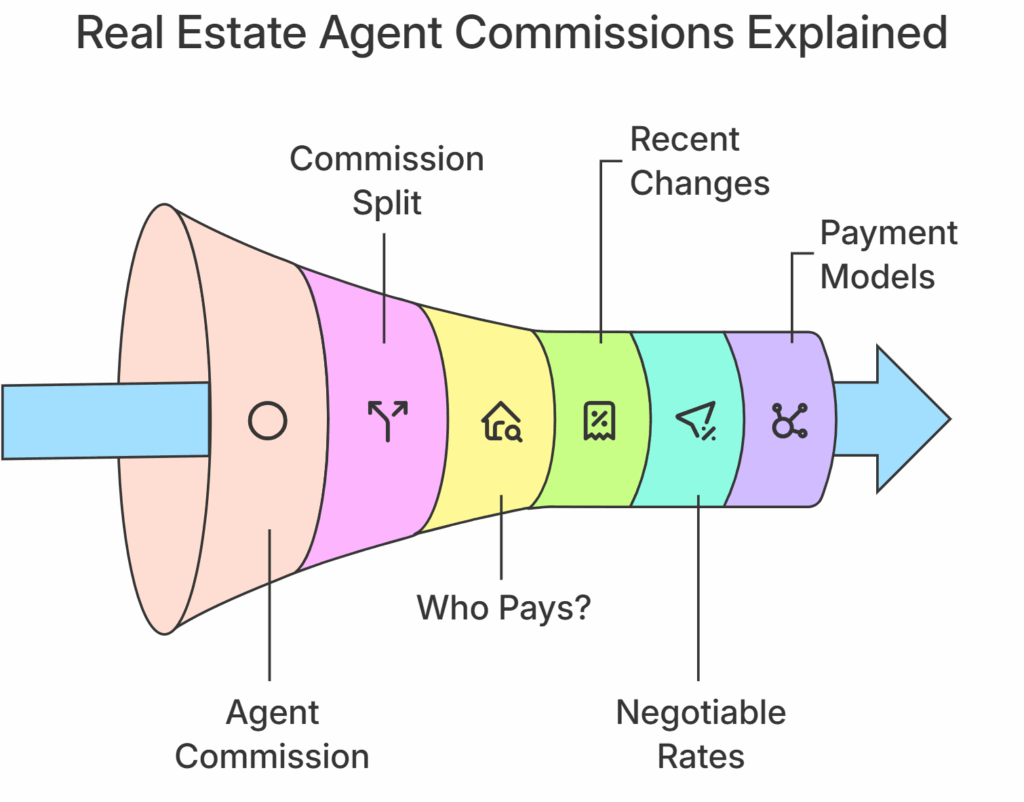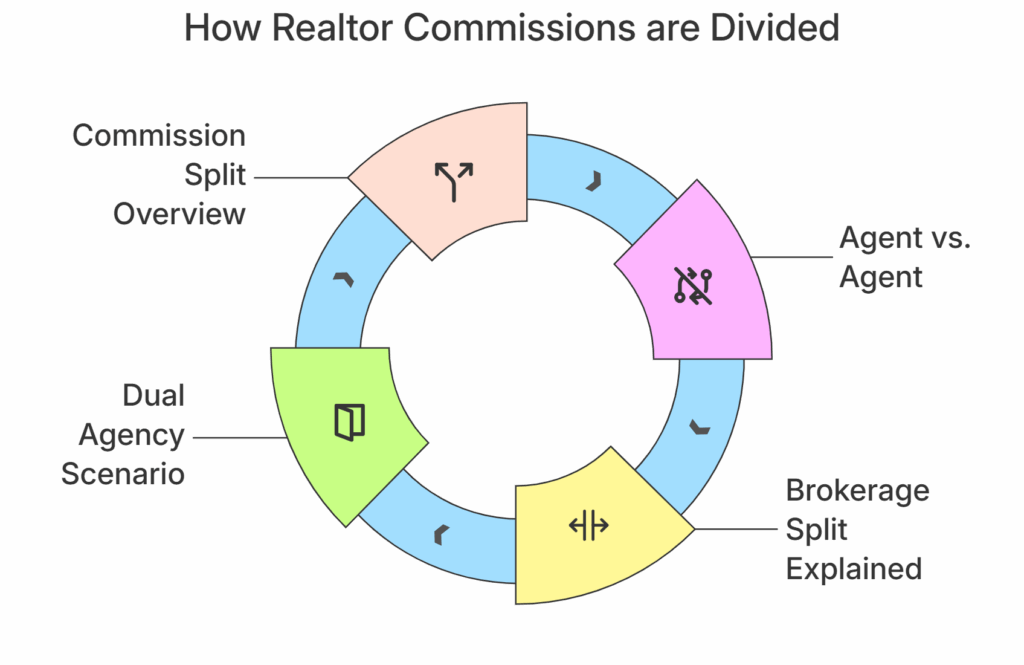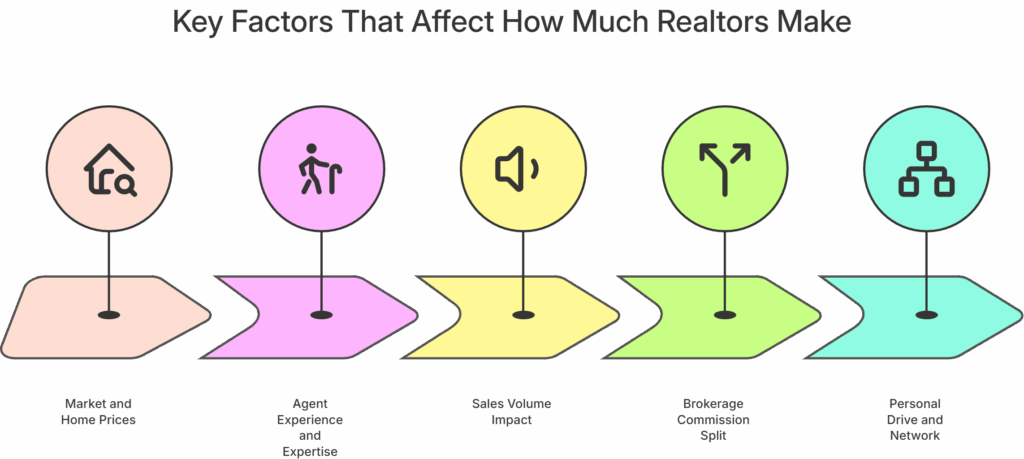
When you sell your house, it’s natural to wonder how much your real estate agent will make from the sale. Real estate agents typically earn money through a commission, which is a percentage of the home’s sale price. In fact, the average Realtor commission has traditionally been between 5% and 6% of the sale price. This commission is usually paid out of the seller’s proceeds at closing, and it covers both the listing agent and the buyer’s agent. Importantly, an agent only gets paid when the sale closes – if your house doesn’t sell, no commission is owed in most cases. With recent industry changes, the way commissions are handled is evolving (more on that shortly), but the commission-based model remains the standard for compensating real estate agents.
Tricia Watts, a seasoned Los Angeles real estate agent, hears this question often from home sellers who want to understand where their money is going. In this guide, we’ll break down how much real estate agents make per sale, how commissions work, and what factors influence an agent’s earnings. We’ll also discuss why those commissions exist and how they benefit you as a home seller. Let’s dive in!
Real Estate Agent Commission Basics (How Agents Get Paid)
Real estate agents are paid via commission – a fee based on a percentage of the final sales price of the home. For example, if a house sells for $500,000 and the commission rate is 5%, the total commission would be $25,000. That commission is typically split between the listing agent and the buyer’s agent, so each would get around $12,500 in that scenario. However, the agent doesn’t get to simply pocket that whole amount, as we’ll explain.
Who pays the commission? Traditionally, the home seller pays the entire commission out of the sale proceeds, and then the listing agent’s brokerage cuts a check to the buyer’s agent’s brokerage for their share. So, while both agents are paid from the commission, the seller is the one footing the bill at closing. This model is why people often ask “what percentage do real estate agents make?” – it’s usually split roughly 50/50 between the two sides. Historically, the combined commission was about 5.8% of the sale price on average, with ~2.9% going to the listing agent and ~2.9% to the buyer’s agent. Both agents typically then split their portion with their brokerage (often a 50/50 split, though it can vary), which means an individual agent’s take-home from one sale is smaller than the gross commission.
Industry update: As of late 2024, there have been new rules impacting real estate commissions. A landmark lawsuit settlement with the National Association of Realtors “decoupled” buyer and seller agent fees, meaning sellers are no longer required to automatically pay a buyer’s agent’s commission. Now, a buyer can negotiate and pay their own agent’s commission directly. In practice, this could mean a home seller might agree to, say, a 3% commission for their listing agent, and the buyer separately pays their agent another negotiated percentage (often similar, around 2.5%–3%). Early anecdotal data suggests that under the new system, sellers and buyers each pay their own agent roughly 2.8%–3% of the price. Many sellers, however, may still offer to cover the buyer’s agent fee as an incentive in slower markets or competitive situations. The bottom line is that commission rates are not fixed or set by law – they are negotiable between you and your agent, and the structure of who pays can vary by circumstance.
Are there other payment models? In most cases, agents work on commission only, which aligns their incentives with your success (they only get paid when your house sells). A few agents might work for a flat fee or a salary in certain settings (for example, some discount brokerages or home buying services), but those are exceptions. The vast majority of real estate professionals rely on commissions, which means their income depends on getting your home sold for the best possible price.
How much does a Realtor make per sale in reality? Let’s look at a quick example of a typical commission split to see how much money a real estate agent might take home from one transaction:
- Example: Your home sells for $300,000 with a 6% commission (a common rate for full service). That’s $18,000 total commission. Split 50/50, the listing agent’s brokerage gets $9,000 and the buyer’s agent’s brokerage gets $9,000. Now assume each agent has an agreement to split commissions with their brokerage 50/50. In that case, each agent personally would earn $4,500 from the sale (before taxes and expenses). If an agent represented both buyer and seller (dual agency), they could theoretically earn the full $18,000 (less their share to the broker) – but dual agency is restricted in some states due to conflict of interest and not every brokerage allows it.

As you can see, an agent’s income per house sold can vary widely. A higher sale price or higher commission percentage means more commission dollars, while a lower price or discounted commission means less. Also remember that agents only get paid if and when the deal closes, and they often spend weeks or months working on a sale. The commission covers all that time and effort, not just the moment the house is sold.
What about annual income? Since agents are paid per sale, their annual earnings depend on how many homes they sell and at what prices. According to the National Association of Realtors (NAR), the median gross income for real estate agents in 2024 was about $47,000. That is the middle-of-the-pack yearly income – which means many agents earn less, and many earn more. Agents with lots of experience (16+ years) often make over $100,000 per year, while those just starting out (under 2 years) might make under $10,000 per year. For context, that median $47k/year works out to roughly $3,900 per month, though income isn’t usually steady every month in real estate. Some months an agent might close multiple deals and earn a big sum, and other months they might have no closings at all. Income can be highly variable in this profession. The key takeaway is that an agent’s yearly pay is tied to their performance and volume: sell more houses (or more expensive houses), and you make more. Next, we’ll explore the factors that can influence how much a realtor makes off a sale.
Commission Splits: Listing Agent vs. Buyer’s Agent vs. Brokerage
When you hear that a Realtor’s commission is, for example, 5% of the sale price, it’s important to understand how that commission is divided among parties. A common misconception is that a single agent pockets the entire 5%. In reality, multiple people share that commission.
- Listing agent vs. buyer’s agent: In a typical home sale, there are two agents involved – the listing agent (who represents the seller) and the buyer’s agent (who represents the buyer). The total commission is usually split evenly between them. So, if the commission is 6%, each side might get about 3%. If it’s 5%, each side gets around 2.5%, and so on. This split is agreed upon in the listing agreement and in the MLS listing. Both agents put in work to close the deal, so both are compensated via the commission.
- Brokerage split: Real estate agents generally work under a brokerage (like a brokerage firm or office that holds their license). The brokerage provides support, marketing, insurance, and other resources to the agent. In return, the agent agrees to split any commissions with their broker. The split can vary: new agents often have to give a larger cut to their broker (sometimes 50% or more), whereas experienced high-producing agents might keep a much bigger portion (some splits are 70/30, 80/20, or even 100% to the agent with flat desk fees). For simplicity, let’s say it’s a 50/50 split between agent and broker. Going back to our example of a $300,000 sale with a $9,000 commission to the listing side: if the listing agent splits 50/50 with the brokerage, the agent keeps $4,500 and $4,500 goes to the brokerage. The same happens on the buyer’s agent side. That agent’s take-home would similarly be whatever is left after their broker’s cut.
- Dual agency scenario: Sometimes one Realtor ends up representing both the seller and the buyer in a transaction (this is called dual agency). In that case, the single agent (and their brokerage) might collect the entire commission. For example, at 5% commission on a $300,000 home, one agent would get the full $15,000 for handling both sides. However, they would still split that with their brokerage per their agreement, and dual agency is not legal in all states because of the potential conflicts of interest. Even when it is legal, many agents approach dual agency with caution as it requires being neutral between the buyer and seller. As a seller, you generally won’t pay more commission if one agent represents both sides – it just means one agent is doing double duty (and earning double commission).

Bottom line: A real estate agent’s actual earnings from a home sale are a fraction of the total commission. By the time the commission is split between two agents and then split again between each agent and their broker, an individual agent might receive only 25%–40% of the home’s total commission in net earnings. For instance, a house selling at $500,000 with a 5% commission yields $25,000 total commission; if our agent is on one side of the deal, their share might be ~$12,500, and after a 50/50 broker split, around $6,250 would actually go to that agent. This framework helps explain how much a realtor makes per sale after all the splits are accounted for.
Examples: Commission Amounts on Different Home Sales
To further illustrate, here are a few examples of real estate commissions on various sale prices:
- $200,000 home: At a 6% commission, total commission = $12,000. Split between agents, that’s $6,000 to the listing agent’s side and $6,000 to the buyer’s agent’s side. Each agent’s take-home (after broker splits, etc.) might be a few thousand dollars. (Many people ask “how much does a Realtor make on a $200,000 sale?” – roughly a few thousand dollars to each agent in the end.)
- $500,000 home: At a 5% commission, total commission = $25,000. Listing agent’s side gets $12,500, buyer’s agent’s side gets $12,500. If an agent keeps, say, 70% after broker split (more experienced agent), they’d take home $8,750 from their side. If they’re on a 50% split (newer agent), they’d take home around $6,250. The higher the home price, the more dollars the same percentage yields – which is why agents in expensive markets can earn large commissions even if the percentage is standard.
- $1,000,000 home: At 5% commission, total commission = $50,000. Each side gets $25,000. An agent on a 50/50 broker split would net about $12,500 from the sale. In high-value areas like Los Angeles, home prices are often in this range or higher. Even if commission rates in competitive markets are sometimes a bit lower (some data shows Los Angeles averages around a 4.6% total commission), the commission in dollars is substantial. For instance, 4.6% of a $1.125 million home in Los Angeles comes out to roughly $51,500 in commission. That amount, split between agents and brokers, still means each agent could make well over $10,000 from a single luxury sale. On the other hand, in a lower-cost market, a higher percentage might be common – e.g., 5.66% on a $385,000 home in Fresno, CA is about $21,800 commission – which then gets divided up among the parties involved.
These examples show how what real estate agents make on a sale can range widely. The price of the property, the agreed commission rate, and the splits all factor in. Next, let’s look at other key factors that affect an agent’s income.
Key Factors That Affect How Much Realtors Make
Not all real estate agents earn the same amount per sale or per year. Several factors influence an agent’s income:
- Local Market & Home Prices: An agent’s location plays a big role. In markets with high property values and strong demand, like Los Angeles or New York, each sale yields a higher commission in dollar terms because the home prices are higher. For example, 3% of a $800,000 home is $24,000, whereas 3% of a $200,000 home is $6,000. On the flip side, in areas where homes are less expensive or sales are slow, an agent might have to close more transactions to make the same income. Also, competition in hot markets can sometimes pressure commission rates slightly lower (as mentioned, Los Angeles averages around 4.5–5% total commission, a bit under the national norm), but the volume and price of sales often compensate for it.
- Experience and Expertise: Seasoned agents often earn more, for a few reasons. With years of experience, agents usually build a reputation and a referral network that brings in more clients. They may also specialize in lucrative niches like luxury homes or commercial properties, which come with higher price tags (and thus higher commissions). Experienced Realtors might also negotiate higher splits with their brokerage (keeping more of each commission) or charge slightly higher commission rates if they provide exceptional service. Newer agents, in contrast, may start with lower income as they learn the ropes and have fewer deals. (Remember, NAR data showed agents with 16+ years earn six figures on average, while rookie agents earn very little until they ramp up.)
- Sales Volume (Number of Transactions): Real estate is often a volume game. An agent who closes 20 home sales a year will obviously make more than one who closes 5, assuming similar price points. Some agents focus on high-volume sales (even if each individual commission is modest), while others might do fewer transactions but each at a high price point. How many houses an agent sells per year and the price of those homes together determine annual earnings. Top producers might sell multiple homes per month, whereas part-time agents might only sell a few homes a year. This wide range is why some Realtors make over a million dollars a year while others struggle to make ends meet.
- Brokerage Commission Split: The commission split arrangement with the broker can significantly impact an agent’s take-home pay. Every agent negotiates (or is offered) a split when they join a brokerage. Some brokerages offer a high split to the agent (like 80/20 or even 100% after a flat fee) – this allows the agent to keep a larger portion of each commission. Other brokerages might have a heavier split (like 50/50 or 60/40) but in exchange provide more leads, support, or paid marketing. For example, an agent at a firm with lots of support might accept giving 50% of commissions to the house, whereas a very independent agent might join a low-overhead brokerage where they keep 90% but must handle all their own expenses. Over the course of a year, these splits make a big difference. An agent who pays a lot in brokerage fees will net less from the same gross commission than one who has a more favorable split.
- Personal Drive & Network: We could also mention that an agent’s work ethic and network matter. Two agents in the same city with similar experience can have very different incomes if one hustles to get new listings and the other relies only on occasional referrals. Real estate rewards those who are proactive in marketing, networking, and client service. An agent who actively markets themselves and follows up with leads can achieve a steadier flow of sales (and income) compared to an agent who is less active. Consistency and client satisfaction lead to more deals, which in turn lead to higher earnings.

In summary, how much money a real estate agent makes is not a fixed number – it’s the result of their market environment, experience level, number of deals, and business arrangements. A Los Angeles realtor like Tricia Watts, for instance, might earn significant commissions on each luxury home sale, but she also faces higher business costs and competition; whereas an agent in a smaller town might earn less per sale but have a lower cost of living and possibly less competition for clients. Next, we’ll look at those business costs and expenses that agents have, which can eat into their gross earnings.
Real Estate Agent Expenses (Costs That Cut Into Commission)
It’s important to realize that real estate agents are essentially small business owners, and not all the commission they earn is pure profit. Agents incur many expenses to operate professionally and successfully. Here are some of the major costs a Realtor often has to cover out of their commission income:
- Marketing and Advertising: Agents typically spend a lot on marketing to attract buyers and sellers. This can include professional photography, staging costs, flyers, online ads, “For Sale” signs, open house events, and websites. In competitive markets (like Los Angeles), agents may also pay for premium listings, social media promotion, and direct mail campaigns. Depending on their strategy and market, agents can spend hundreds or even thousands of dollars per month on marketing. For example, running targeted Facebook ads or mailing postcards to a neighborhood can add up quickly. These investments aim to get your home sold faster and for a higher price, but they do come out of the agent’s pocket until the home sells (and sometimes even if it doesn’t sell).
- Professional Fees (Licensing, MLS, Associations): To practice real estate, agents must maintain an active real estate license, which involves licensing fees and periodic continuing education courses. They also typically join their local Realtor association and the Multiple Listing Service (MLS). MLS membership and Realtor board dues can cost several hundred dollars a year. Agents pay these fees to get access to property listing databases and to operate under the Realtor code of ethics. There are also costs for lockboxes (secure devices for home keys), errors and omissions insurance (professional liability insurance), and sometimes desk fees if their brokerage charges for office space. All told, an agent might spend a few thousand dollars a year on these professional fees and memberships to stay in business and well-informed.
- Ongoing Training and Education: Top agents often invest in training, coaching, and certifications to improve their skills (for instance, courses on luxury home marketing, negotiation seminars, etc.). While not mandatory beyond basic licensing, these can be valuable but do add to expenses.
- Travel and Transportation: Real estate agents do a lot of driving – showing homes to buyers, visiting listings, meeting clients all over town. Thus, fuel, car maintenance, and auto insurance are significant costs. Many agents also choose to drive a reliable (and presentable) vehicle given the client-facing nature of their work. Some even wrap their car with advertising. These costs reduce the net income an agent gets to keep from their commissions.
- Office and Technology: Agents often need to have a home office setup or pay for a desk at a brokerage office, plus technology tools like a good laptop, smartphone, printer, and possibly specialized real estate software or customer relationship management (CRM) systems. They also incur expenses for paperwork, signage, lockboxes, and sometimes client hospitality (e.g., providing bottled water and snacks at open houses, small closing gifts for clients, etc.). All of this is part of running their business. Even seemingly small things can add up.
After accounting for these expenses, the net profit an agent keeps from their gross commissions might be considerably less. It’s not unusual for an agent to spend 20-30% (or more) of their commission income on business costs. As a result, an agent who grosses, say, $100,000 in commission in a year might net $70,000 or $60,000 (before personal income taxes) after paying for all the tools and services that helped generate that business. Every agent must budget carefully to ensure their commission earnings exceed their expenses and that they’re providing great service without overspending.
The Value of Real Estate Agent Commissions (Why Agents Earn Their Fee)
At first glance, a commission that amounts to thousands of dollars per sale might seem high, especially to a homeowner who is writing that check at closing. However, it’s crucial to understand what you are paying for when you pay a real estate commission – and why it can actually save or earn you money in the long run.
You’re paying for expertise and service. A real estate transaction isn’t as simple as putting a sign in the yard and collecting a check. There are many parties and steps involved – buyers, sellers, home inspectors, appraisers, mortgage lenders, escrow or title companies, attorneys, and more. A top agent acts as the quarterback for the entire process, coordinating with all these parties and navigating any issues that arise. Tricia Watts notes that part of a Realtor’s job is “making sure everyone – from the inspector to the lender to the title company – is doing their part so the transaction stays on track.” This project management aspect is something most sellers don’t have the time or expertise to handle on their own.
Skilled agents maximize your sale price. Perhaps the biggest value an agent brings is experience in pricing and negotiation. Realtors analyze market data to price your home correctly, market it to attract qualified buyers, and then negotiate offers to get you the best possible price and terms. A great agent can often sell your home faster and for more money than you could on your own. In fact, studies have shown that the top 5% of agents can help clients sell for as much as 10% more than the average agent. That means a top agent’s expertise might add tens of thousands of dollars to your sale – easily covering the cost of their commission and then some. Even for non-top-tier agents, having someone who knows how to navigate bidding wars or handle tough buyers can protect your financial interests.
Commissions incentivize results. Because agents only get paid when a sale closes, they are highly motivated to make your transaction successful. They will advise you on how to make your home more appealing (sometimes suggesting improvements or staging), handle marketing, field inquiries, host showings, and guide you through complex paperwork – all without any upfront charge. If the home doesn’t sell, the agent generally doesn’t get paid a commission. This contingency means agents are invested in your outcome. They also often invest their own money in marketing your property (photography, ads, etc.) with the expectation that it will pay off in the sale. This structure aligns your agent’s interests with yours – both of you want the house sold for the highest price the market will bear.
Saving you time and stress. Selling a home is a time-consuming process with a lot of legal and logistical hurdles. From preparing the home, scheduling showings, handling offers and counteroffers, to navigating inspections and closing paperwork, there’s a tremendous amount to manage. Agents do this day in and day out, so they know how to avoid pitfalls and keep things moving smoothly. For sellers, having an agent means you don’t have to field calls from multiple buyers, worry about marketing, or decipher real estate contracts alone. The commission pays for someone to shoulder that burden and use their know-how to get you to the finish line.
Negotiation and problem-solving: During a transaction, many issues can pop up – a buyer’s financing might wobble, an inspection might reveal repairs, or the appraisal might come in low. Real estate agents are trained to problem-solve these issues and renegotiate as needed to keep the deal together. This can be the difference between a sale closing or falling apart. A good agent’s guidance through these challenges is incredibly valuable, especially if you’ve never sold a home before.
In short, while it’s understandable to ask “what do real estate agents make on a sale, and is it worth it?”, the commission compensates agents for the professional services that help you achieve your goals. A trustworthy, hardworking agent earns their commission by adding value to your sale – through pricing strategy, marketing exposure, and transaction management – often resulting in a higher net profit to you, even after their fee. Think of it as an investment in a smoother, more lucrative home sale experience.
Frequently Asked Questions about Realtor Commissions
Q: Are real estate agent commissions negotiable?
A: Yes. Commission rates are not set in stone – they can vary and are always negotiable between you and your agent. Many agents charge around the prevailing rate in your area (often 5–6% total), but depending on the situation, some might agree to a lower fee. For example, if a single agent ends up representing you and the buyer, they might reduce the total commission since no second agent is involved. Or a highly experienced agent might have a firm commission rate but offer exceptional service, whereas a newer agent might be more flexible to win your business. Keep in mind, though, that a lower commission isn’t always the best deal – a discount agent who doesn’t market your home effectively could net you a lower sale price. It’s about value for the fee. Everything in real estate is negotiable, including commissions, but be sure you’re not sacrificing service and results for a small discount.
Q: Do agents make more money if they represent both the buyer and seller?
A: Potentially, yes. If one agent handles both sides of the deal (dual agency), that agent’s brokerage stands to collect the entire commission instead of splitting it with another brokerage. This means the agent could earn roughly double what they would on a one-sided deal (minus whatever split they owe their broker). However, dual agency comes with ethical considerations. Because the agent is working for both the seller and the buyer, they can’t fully advocate for one party over the other, which is why dual agency is illegal in some states and carefully regulated in others. Many agents prefer not to do dual agency, and some brokerages prohibit it internally. If it does happen (for instance, your listing agent also finds the buyer), you can sometimes negotiate a slight reduction in the commission since it’s one agent doing all the work. Always make sure you’re comfortable with the arrangement and that your interests are protected.
Q: Do I have to pay the real estate agent’s commission if my house doesn’t sell?
A: In most cases, no – you only pay commission if your home sale successfully closes. Real estate commissions are generally contingent on the sale. This is why agents are motivated to get your house sold. That said, you should always check the details in your listing agreement. Occasionally, there could be clauses about covering certain costs if you cancel the listing early or if the agent procured an offer at full price and you declined it, etc. But as a rule, if the transaction doesn’t close, no commission is due. Always clarify this with your agent upfront. Most traditional home sales follow the “no sale, no commission” practice.
Q: How is the commission split if there is a referral or multiple agents involved?
A: If another agent or broker referred you to your agent, sometimes a referral fee is paid out of the commission. For example, Agent A refers you to Agent B, and you close a deal – Agent B might pay 25% of their commission to Agent A’s brokerage for the referral. Additionally, if a team of agents is listing your home (say, you have a lead agent and a co-listing agent), they might share the listing side of the commission. These splits all come from the same pie; they don’t typically increase the total commission, but they divide it among more parties. As a seller, you usually won’t need to worry about the internal breakdown – you’ll just agree to the total commission rate, and the agents will handle who gets what on the back end.
Conclusion: Making the Most of Your Home Sale in Los Angeles
Understanding how much real estate agents make on a home sale gives you insight into why commissions are structured as they are. While an agent’s earnings per sale can be significant, that commission fuels the work that helps sell your home faster and for a higher price. From marketing expenses to countless hours of expertise, there’s a lot behind the scenes that the agent’s commission covers. The good news is that you, as a seller, only pay when you get results. A great agent is motivated to maximize your profit and make the process as smooth as possible – truly earning their fee.
If you’re thinking of selling your home (or buying one) in the Los Angeles area, it pays to work with a knowledgeable professional. Tricia Watts is a Los Angeles-based real estate expert who understands the local market and is committed to straightforward, empathetic service. With the right agent by your side, you can navigate the commission process with confidence and get the best outcome for your sale.
Ready to take the next step? If you have more questions about agent commissions or want personalized guidance for your situation, reach out to Tricia Watts for a no-obligation consultation. We’re here to help you make informed decisions and ensure you get the most value when you sell your home. Let’s turn your real estate goals into reality!




